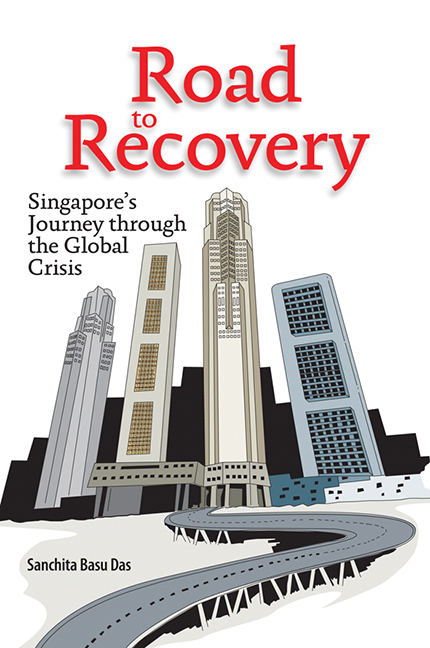Book contents
- Frontmatter
- Dedication
- Contents
- List of Tables
- List of Figures
- List of Boxes
- Foreword
- Acknowledgements
- Abbreviations
- 1 Introduction
- 2 Global Financial and Economic Crisis: Causes, Impact, and Policy Response
- 3 Impact of Global Economic Crisis on Singapore
- 4 Singapore's Policy Responses to the Global Economic Crisis
- 5 Singapore Economic Perspective and Future Policy Directions
- 6 Lessons Learnt
- Appendix I MAS Monetary Policy Statements
- Appendix II Key Budget FY2009 Initiatives
- Appendix III Summary of the ESC Key Recommendations
- Appendix IV Key Budget FY2010 Initiatives
- References
- Index
- About the Author
5 - Singapore Economic Perspective and Future Policy Directions
Published online by Cambridge University Press: 21 October 2015
- Frontmatter
- Dedication
- Contents
- List of Tables
- List of Figures
- List of Boxes
- Foreword
- Acknowledgements
- Abbreviations
- 1 Introduction
- 2 Global Financial and Economic Crisis: Causes, Impact, and Policy Response
- 3 Impact of Global Economic Crisis on Singapore
- 4 Singapore's Policy Responses to the Global Economic Crisis
- 5 Singapore Economic Perspective and Future Policy Directions
- 6 Lessons Learnt
- Appendix I MAS Monetary Policy Statements
- Appendix II Key Budget FY2009 Initiatives
- Appendix III Summary of the ESC Key Recommendations
- Appendix IV Key Budget FY2010 Initiatives
- References
- Index
- About the Author
Summary
Being a small and open economy, Singapore is susceptible to external shocks, but by the same measure, the city state tends to bounce back faster and stronger than many other regional economies. Thus, following the global economic recovery, Singapore also catapulted itself out of recession in the third quarter of 2009. The economy expanded by 0.6 per cent, the first expansion after three straight quarters of contraction. The growth was driven by expansion in the electronics manufacturing sector and improvements in the trade-related and tourism sectors on the back of a gradual stabilization in global economic conditions.
But this fast turnaround may not be without hiccups. Weak household balance sheets and persistently high unemployment, especially in the United States, might weigh down consumer demand in Singapore's key export markets. Although external demand will continue to grow, it will be at a sluggish pace. Growth momentum in the second half of 2010 may also slow down as the effects of global fiscal stimulus measures and inventory restocking wane. The city state may experience uneven recovery across sectors. According to the Ministry of Trade and Industry of Singapore, the economy is expected to grow by 4.5–6.5 per cent in 2010, after shrinking by 2.0 per cent in 2009.
World Economic Outlook
The global economic recovery seems to be well under way. Businesses and consumers are slowly realizing that worst-case scenarios are almost over and are adjusting their consumption, investment, and hiring behaviour according to a more benign economic behaviour. Most importantly, businesses are no longer cutting on their inventories. The advanced economies, which were hit particularly hard by the financial crises and the collapse in world trade, are showing signs of stabilization, driven mainly by an unprecedented public policy response. The rebound in emerging economies is being led by a resurgence of Asia, fuelled by policy stimulus and a turn in the global destocking activities. This was also reflected in the financial markets as investors’ risk aversion declined, portfolio flows recovered, and stock prices rallied.
- Type
- Chapter
- Information
- Road to RecoverySingapore's Journey through the Global Crisis, pp. 97 - 127Publisher: ISEAS–Yusof Ishak InstitutePrint publication year: 2010



